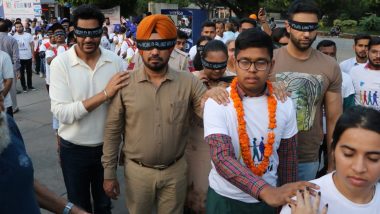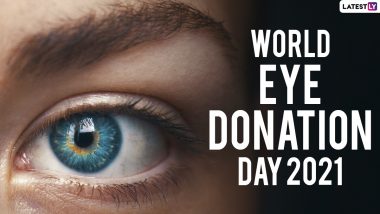Over 1.5 million people have corneal blindness in India out of which 80% cases are preventable. While corneal blindness can be treated by corneal transplantation, the lack of cornea donation people keeps the patients on the waiting list. In observance of World Eye Donation Day, we wish to highlight the need for eye donors in the country. Organ donation requires keen awareness and the willingness to come forward and pledge to donate their eyes. Here's what you should know if you wish to donate your eyes.
1. You Can Be a Donor at Any Age
You can consider yourself a potential donor irrespective of your age and medical history. That said, your medical condition at the time of death will determine what eye tissues can be donated. Prevention of Blindness Week 2020: Eye Exercises to Improve Your Eyesight and Prevent Vision Problems.
2. You Can Donate With Many Medical Conditions
At the time of death, the medical professionals will review your medical histories to determine whether you can be a donor. However, with recent advances in transplantation, many more people with medical conditions can be potential eye donors. You can donate your eyes irrespective of whether you are diabetic, hypertensive, asthmatic or have any other infectious disease.
3. The Severity of The Illness Determines the Recipient
When a patient is in a transplant waiting list for donor's eyes, what counts is the severity of their illness, blood type, their wait time and other important medical information. Celebrity status or wealth do not determine who gets the transplant.
4. You Can Give Vision to Two Blind People
Did you know that one pair of eyes can give vision to two corneal blind people? In fact, if it can help many more if the eye tissue is further used for research and education. Staring at Laptop and Mobile Phone Screens All Day Damages Your Eyes: Here's How to Reduce the Digital Eye Strain During Lockdown!
5. Only a Trained Practitioner is Can Retrieve Your Eyes
A registered medical practitioner is the only one who is permitted to retrieve your donated eyes. The process is done by trained eye bank technicians and optometrists, to harvest more corneas. From Reducing Puffiness to Brightening Your Skin, Here’s How Applying Green Tea Bags Under Your Eyes Can do Wonders!
6. Corneal Transplant Surgeries are Often a Success
About 90% of all corneal transplant surgeries successfully restore the corneal recipient's vision. While the recovered vision may not be the same as the original one, but various other means like contact lenses and suture adjustments can restore the vision.
7. There is No Cost to Your Family for Eye Donation
There is no cost to your family for eye donation. So, your family will not have to bear the brunt of your decision.
Just you have the power to save or enhance the life of a patient through eye donation. Do not let those myths stop you from signing up for this.
(The above story first appeared on LatestLY on Jun 10, 2020 12:15 PM IST. For more news and updates on politics, world, sports, entertainment and lifestyle, log on to our website latestly.com).













 Quickly
Quickly




















